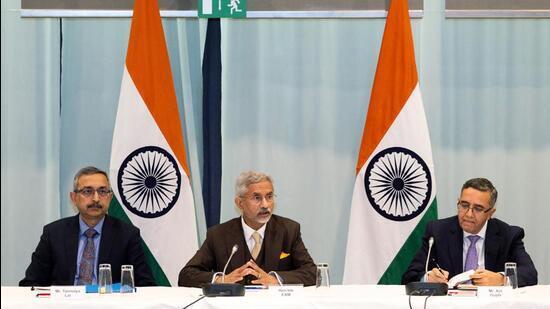
India’s Strong Response Pushed Pak for Ceasefire: S Jaishankar
In a significant development, India and Pakistan have agreed to a ceasefire along the Line of Control (LoC) after a series of violent incidents and terror attacks. The breakthrough came after India’s External Affairs Minister, Dr. S Jaishankar, revealed that the understanding was “negotiated directly between the militaries” of the two countries. In a recent interview, Jaishankar shed light on the events that led to the ceasefire, stating that India’s strong response to Pakistan’s aggression pushed the latter to agree to a truce.
The ceasefire agreement came after India launched Operation Sindoor on May 7, in retaliation for the April 22 terror attack in Pahalgam, which killed three Indian soldiers. The operation was a significant move by the Indian Army to target Pakistan-backed terrorists and dismantle their hideouts in the region.
According to Jaishankar, the Indian Army’s strong response to Pakistan’s aggression played a crucial role in pushing the latter to agree to a ceasefire. “The Indian Army’s response was very effective, and Pakistan realized that they needed to stop the firing and reach an understanding about how to deal with it,” he said.
The External Affairs Minister also emphasized that the ceasefire agreement was not a one-sided affair, but rather a mutually agreed-upon understanding between the two militaries. “The understanding was negotiated directly between the militaries. It was not a government-to-government agreement, but a military-to-military understanding,” he clarified.
The ceasefire agreement comes as a significant relief to the people of Jammu and Kashmir, who have been living in fear of terrorist attacks and cross-border firing. The region has witnessed a surge in violence in recent months, with several incidents of ceasefire violations and terrorist attacks reported.
The Indian government has been vocal about its commitment to addressing the issue of terrorism and ensuring the safety and security of its citizens. The launch of Operation Sindoor was seen as a strong message to Pakistan that India would not tolerate terrorist attacks on its soil.
In recent years, India and Pakistan have been engaged in a series of skirmishes along the LoC, with both sides accusing each other of ceasefire violations. The situation has been further complicated by the presence of terrorist groups operating in the region, who have been using the LoC to launch attacks on Indian soil.
The ceasefire agreement is seen as a significant step towards de-escalating tensions between the two countries and reducing the risk of conflict. However, many experts have cautioned that the agreement is fragile and requires sustained efforts to maintain peace and stability in the region.
In the aftermath of the agreement, both India and Pakistan have been working to restore communication and dialogue. The two countries have also been engaging in talks to resolve outstanding issues, including the Kashmir dispute.
The Indian government has been emphasizing the need for Pakistan to take concrete action against terrorist groups operating from its soil. Jaishankar has been pushing for a comprehensive approach to tackling terrorism, which includes the dismantling of terror infrastructure and the prosecution of terrorists.
As the situation continues to unfold, it remains to be seen whether the ceasefire agreement can be sustained in the long term. However, the fact that India and Pakistan have been able to agree on a mutually accepted understanding is a significant development that could potentially pave the way for a more durable peace in the region.






